#biblehebrew
Text
Theology Thursday: Mark 11:17
Jesus is famous for his parables. In the last week of his life on earth, Jesus dramatically clears the temple of money changers. As recorded in Mark 11:17 he says, “ Is it not written: ‘My house will be called a house of prayer for all nations’? But you have made it ‘a den of robbers.’” He is quoting two different OT verses, Isaiah 56:7 and Jeremiah 7:11. Both are quoted nearly verbatim from the Septuagint (Greek translation of the Hebrew Bible) although in this case, the Greek translation is a literal translation of the Hebrew. Both verses should have been familiar to anyone who witnessed the scene.
So, was Jesus just throwing a tantrum, in contrast to his mild manner throughout the rest of his ministry? That could mean it’s ok for us to follow his example since we know nothing Jesus does is a sin. Or is this a special case and there is more to it? Some say this is Jesus acting out a parable. The location of the event was the court of the gentiles at the Temple. Evidently the elitism of the Jews had prompted them to edge the gentiles out of the court designated for them and filled it with tables of money changers. Jesus is making it obvious that it is unacceptable to violate God’s clear instructions for his house to be a house of prayer for all nations, not just his chosen people, the Jews. The scene must be important because it’s recorded in all four gospels. Jesus loves us and shows it in many ways, not just by giving his life for us.
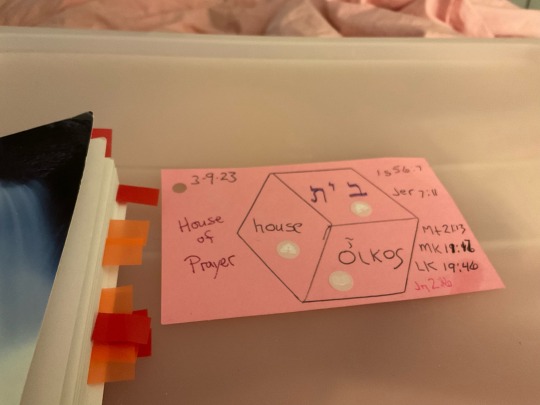
2 notes
·
View notes
Text
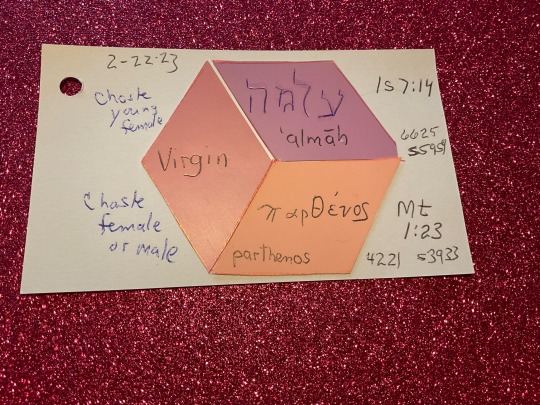
Theology Thursday
It’s been a while since I’ve posted a Hebrew and Greek tumbler, but I recently learned that the Septuagint (Greek translation of the Hebrew Old Testament) used a more precisely “virginal” Greek word to translate a Hebrew word which in modern times attracted less virginal aspersions. It may be as edifying to others as it is to me to know that. Casting doubt on the miraculous virgin birth of our Lord is a relatively recent (in my lifetime) scholarly heresy.
1 note
·
View note
Photo
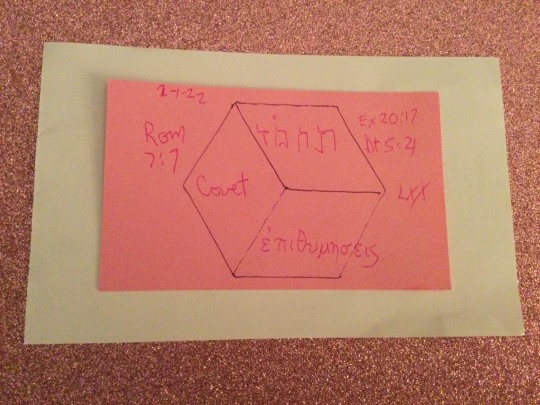
Theology Thursday Romans 7:7 In this deeply personal passage of Paul’s letter to the Romans, Paul uses a simple quote from the Ten Commandments to explain the contrast between law and grace. The passage is written in the first person, almost as a confession of Paul’s own sin and sinfulness. He uses the law as a metaphorical mirror that shows us our sinfulness and makes our need for grace glaringly obvious. The partial quote “Ουκ επιθυμησεις” in the Greek and לא תהמד in Hebrew is identical in Exodus 20:17 and Deuteronomy 5:21, usually translated “You shall not covet.” The Greek is a simple translation of the Hebrew, both in the Septuagint and in Romans 7:7. Coveting is an old fashioned verb and an unfamiliar concept in 21st century affluent society. It seems whole advertising strategies are essentially based on getting the viewer to covet the advertised item. The commandment lists a few examples and ends with the very comprehensive “or anything that is your neighbor’s”. Coveting could be defined as the opposite of being content with what we have. These days it is difficult to consider it a sin even though it is prominently featured in the Ten Commandments. Does even one day go by without us coveting our neighbor’s car or house or children or flowers or relationships or achievements or health? We would be wise to reflect on this passage and use this command as a mirror to show us our own sin and desperate need for grace. Once we fully understand Paul’s points, we can declare with him, “Thanks be to God, through Jesus Christ our Lord!” (Romans 7:25a)
1 note
·
View note
Photo

July 29, 2021 Theology Thursday: The Good Shepherd Recently I played a number of flute duets in church. They all shared a common theme of sheep and shepherds, the best known being Bach’s “Sheep May Safely Graze”. This got me thinking about pastoral scriptures and I just had to look into it. When Jesus says, “I am the good shepherd...” (John 10:11) it is difficult to miss the probable allusion to Old Testament passages involving shepherds and sheep, especially Psalms 23 and 80. In English the two words are obviously related, but not so clearly in Hebrew or Greek. Shepherding is an English verb of tending and caring, from which shepherds get their name. Psalm 23 begins, “The Lord is my Shepherd...” The Hebrew word is רָעָ�� (Strong’s 7462). The Greek (LXX 22:1) is ποιμήν (Strong’s 4166) the same root as in John 10:11, where the word for sheep is πρόβατον (Strong’s 4263). The NETS translates Psalm 22:1, “The Lord shepherds me...” Psalm 80 begins, “Give ear, O Shepherd of Israel,...” The Hebrew word used is the same as in Psalm 23, as is the Greek of the Septuagint (LXX 79:2). The NETS rendering is “you who shepherd”. Hebrew uses two main words for sheep, שֶׂה (Strong’s 7716) used in Psalm 119:176 and the more common צֹאן (Strong’s 6629 - 247x) used in 16 Psalms including 49:14, 144:13 and the well known Isaiah 53:6. Neither are limited to sheep but can also mean other small herd animals. Both Hebrew words for sheep are typically translated in the Septuagint by the Greek word πρόβατον, more narrowly describing only sheep.
0 notes
Photo
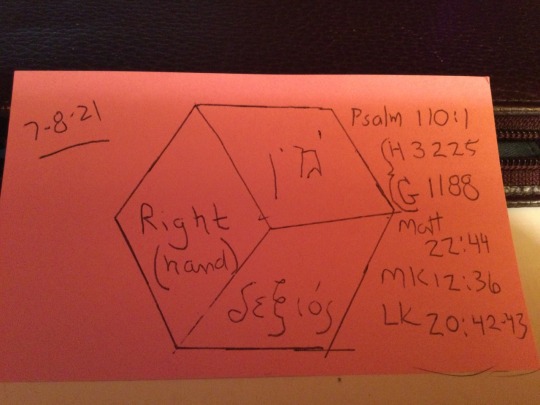
Theology Thursday: Jesus Quotes Psalms Among the most cryptic Psalms Jesus quotes is Psalm 110:1 (LXX 109:1) “The Lord said to my lord, “Sit at my right hand until I make your enemies a footstool for your feet.” Jesus introduces this Psalm to challenge the Pharisees regarding Messiah (Matt. 22:44, Mark 12:36, Luke 20:42-43). Luke quotes the LXX almost exactly (missing only an article ὁ). Matthew and Mark change the final phrase to “put thy enemies under thy feet.” Luke’s quote of the LXX is considered a “correct translation of the Hebrew.”39 The variation quoted in Matthew and Mark is attributed to “the influence of the analogous passage Ps. 8:7.”40 The Greek phrase κάθου ἐκ δεξιῶν μου is quoted exactly from the LXX by all three gospels with no noun for the implicit “hand” - literally “on my right” (NETS41). “Jesus points out David must have known Psalm 110:1 referred to Messiah (Matt. 22:43).”42 After Jesus is arrested he uses a similar “right hand” quote (Matt. 26:64, Mk. 14:62, Lk. 22:69), perhaps alluding to the previous exchange. Gentry says, “Jesus combines Psalm 110 and Daniel 7:13 to portray the Messiah as the ruler coming to reign over the earth in a universal, worldwide, everlasting kingdom.”43 Footnotes: 39 Moyise & Menken, The Psalms in the New Testament, 74. 40 Ibid. 41 Jobes, Discovering the Septuagint, 199, 200. 42 Chou, The Hermeneutics of the Biblical Writers, 124. 43 Peter J. Gentry, How to Read and Understand the Biblical Prophets (Wheaton, IL: Crossway, 2017), 468.
0 notes
Photo

Theology Thursday October Virtue: Confidence “Ecce ego vobiscum sum—Behold I am with you. —MATT. 28:20” These are among the most comforting words ever spoken by our Lord and Savior. We can be confident that we are never alone as we walk through any kind of troubles and trials. The sentence begins with ‘behold’ which is tells us to pay attention because this is important. The word μετά (‘sum’ in Latin) commonly used for ‘with’ is easy to understand. The excerpt continues, “always, even to the end of the age.” The Greek phrase translated ‘always’ is παρας τας ἡμέρας literally ‘all the days’. I find it especially comforting to know that Jesus is with me each and every day. This assurance helps me build confidence, our October Virtue and strengthens my faith. I can be sure Jesus is with me every day because He said so! Any time we read Jesus saying ‘I am’ (ἐγώ εἰμί) we can hear an echo of the personal name of God through the scriptures, which reminds us that this verse in Matthew is not the first time we have heard the promise that God is with us. It is covenantal language. One of those instances I stumbled upon recently is Judges 6:16, “Surely I will be with thee.” (Spoken to Gideon.) Two others I looked up by tracking the Hebrew Word עִם (translated ’with’) are Genesis 26:3 (to Isaac) and Genesis 28:15 (to Jacob). Phrases are more difficult to follow than nouns and verbs, but the concept of ‘God with us’ is a thread woven throughout scripture from Genesis to Revelation. As we approach Advent it is a perfect meditation on the many ways God says and shows His presence in our lives. Excerpt From Cultivating Virtue Anonymous https://books.apple.com/us/book/cultivating-virtue/id1236178852 This material may be protected by copyright.
0 notes
Photo

Theology Thursday: Cursed ἐπικατάρατος אָרַר Sometimes I wonder how many of us suspect that our country is cursed because of extended and expanding ungodliness. In my lifetime God and God’s written Word have been systematically and gradually stamped out of schools, businesses, government and a large percentage of churches. This summer the Democratic National Convention removed ‘one nation under God’ from their Pledge of Allegiance on national TV. Perhaps that was merely a formality signifying that much of our nation no longer values God. In that alone our nation resembles the nation of Israel in the many times when the Israelites turned their backs on God. That should give us pause if we are familiar with those occasions in history. There are practical consequences to defiantly disobeying God. The Old Testament is littered with phrases concerning blessing and cursing. The Hebrew word for cursed (Strongs 779) אָרַר appears 52 times, including a series of curses in Gen. 3:14-17 resulting from Adam and Eve’s disobedience in the Garden. Psalm 119:21 summarizes the cause of cursedness as straying from God’s commandments. Psalm 119:21 ‘Thou didst rebuke the insolent, accursed ones, who wander from thy commandments;’ (RSV) Fortunately for everyone, protection from the curse is available and God has offered recovery in Christ. The Greek word is ἐπικατάρατος (Strong’s 1944) and appears only 3 times in the New Testament. It is the Greek word used to translate the Hebrew אָרַר in Psalm 119, if you are using Psalm 119 to map Hebrew words into Greek, as I have been. Galatians 3:10 ‘For as many as are of the works of the law are under a curse. For it is written, "Cursed is everyone who doesn't continue in all things that are written in the book of the law, to do them."’ :13 Christ redeemed us from the curse of the law, having become a curse for us. For it is written, "Cursed is everyone who hangs on a tree," So the obvious solution to our predicament is to acknowledge what Jesus did for us in death and resurrection. I can think of nothing to do but pray for our nation to return to God. It seems appropriate to me that the ‘Virtue’ for the month of September is Prayer. Let’s spend as much of this month in prayer as possible! “Oportet semper oras et non deficere—We must always pray, and not faint. —LUKE 18:1” Excerpt From Cultivating Virtue Anonymous https://books.apple.com/us/book/cultivating-virtue/id1236178852 This material may be protected by copyright.
0 notes
Photo
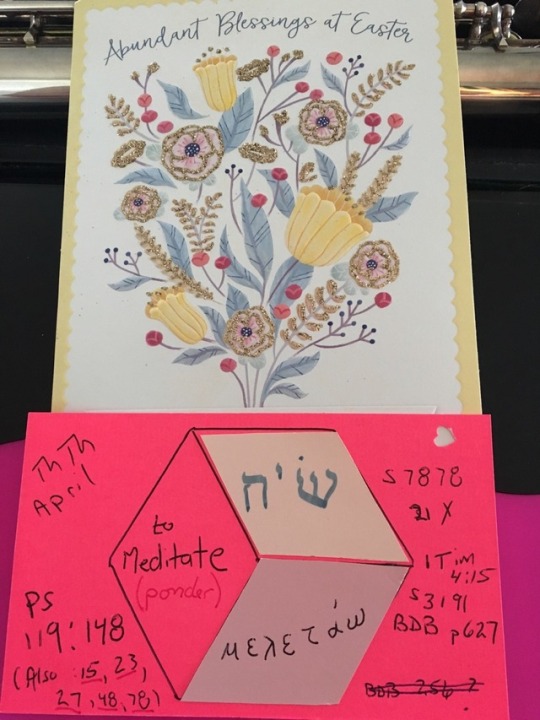
Theology Thursday Lent / April - Meditate The season of Lent has long been a time to meditate on God’s Word and words. The Hebrew word for meditate is שִׂ֫יחַ. It appears several times in Psalm 119, but not as the first word in any of the eight verses of the shin stanza. Psalm 119:148 is one of the uses; “My eyes stay open through the night watches, that I might meditate on your word.” The Septuagint (LXX) translates the verb to μελεταω, a verb found only 3 times in the New Testament. One of those verses is 1 Timothy 4:15. Neither the Hebrew nor the Greek are words found in basic vocabulary lists. Surprisingly, all the other verses in Psalm 119 translate the Hebrew verb into a different Greek verb I do not recognize and could not figure out. Sometimes the New English Translation of the Septuagint (NETS) offers ‘ponder’ instead of ‘meditate’ as the English translation in those instances. In any language, it is always helpful to meditate on God’s word.
0 notes
Photo
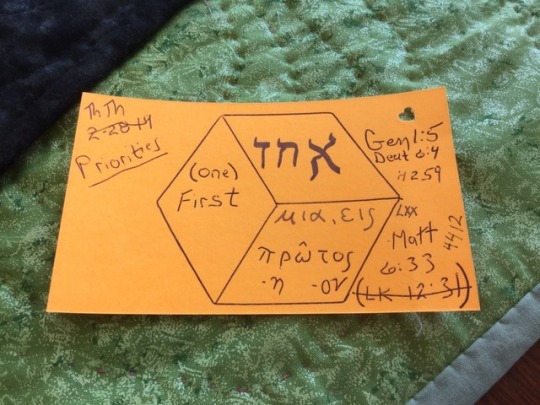
First: Theology Thursday As March begins, I have been meditating on Matthew 6:33, “But seek first God's Kingdom, and his righteousness; and all these things will be given to you as well.” Priorities in life are important and this command from Jesus makes me think that this priority will keep my life on track. Naturally I looked at the Greek. The Greek word for ‘first’ is πρῶτον the root of our scientific word ‘proton’. I wondered how this fits into Hebrew thought, but the Hebrew words translated ‘first’ do not map directly into Greek. An English word search offers ‘firstborn’ and ‘firstfruits’ most often. The most familiar passages with ‘first’ in the English translation are Genesis 1:5 and Deuteronomy 6:4 which use the Hebrew word אֶחָד. In the Septuagint neither of these verses employs our Matthew term, but instead use forms of μια / εις. If only every verse that interested me were an Old Testament quote! Then it would be easier to compile my Hebrew/ Greek/ English vocabulary cards! I will continue to seek first God’s kingdom and His righteousness to the best of my ability.
0 notes
Photo

Valentine Theology In the Sermon on the Mount, Jesus explains the difference between traditional expressions of reciprocated love and the holy version of loving our enemies. In Matthew 5:48 Jesus concludes His radical presentation of love by making what appears to be an impossible command, “Therefore you shall be perfect, just as your Father in heaven is perfect." The Greek word used is τέλειος, having the sense of completion of a process of maturation. Most scholars agree that this is a quote of or allusion to the well-known verse from Leviticus 19:2 “Speak to all the congregation of the children of Israel, and tell them, ‘You shall be holy; for I Yahweh your God am holy.’” The Hebrew word is קָדוֹשׁ. In the Septuagint it is translated into Greek using the directly corresponding word άγιος. Neither the Hebrew nor the Greek is even slightly ambiguous. The Leviticus verse is God’s instruction to Moses for the people of Israel. It must have seemed an impossible command then and throughout the following centuries. If anything, Jesus’ substitution of the word ‘perfect’ for the word ‘holy’ could be construed as making the command even more impossible for us to follow. Scholars have been unable to explain the difference between the original verse and Jesus’ revised quote by any reason except deliberate intent on the part of our Lord. Naturally, I wonder why Jesus made that change to such a well-known command. The similarity I see between the original challenge to be holy and the clarified command to be perfect is the insight that sanctification is a process of learning to love as Jesus loves; a journey that leads toward the holiness and perfection of our heavenly Father by taking millions of tiny steps of loving God, each other and our enemies. Holy Valentine’s Day!
0 notes
Photo

Theology Thursday Matthew and Isaiah in the wilderness Matthew 3:3 quotes Isaiah 40:3 rather exactly from the Septuagint (ancient Greek translation of the Hebrew Scriptures). ‘For this is he who was spoken of by Isaiah the prophet, saying, "The voice of one crying in the wilderness, make ready the way of the Lord. Make his paths straight."’ Mark 1:3 and Luke 3:4 and John 1:23 also quote the same verse, with John applying it to himself. The Greek phrase in all four Gospels is “φωνὴ βοῶντος ἐν τῇ ἐρήμῳ” which is an exact quote of the Septuagint Greek in Isaiah 40:3. This seems significant to me because the quote is so exact in word order, verb tense and other grammatical details. In all four Gospels the quote is introduced with attribution to “Isaiah the prophet” making it easy to confirm the source. The source verse in the Hebrew Bible Isaiah 40:3 reads somewhat differently: ‘The voice of one who calls out, "Prepare the way of Yahweh in the wilderness! Make a level highway in the desert for our God.’” קֹ֣ול קֹורֵ֔א בַּמִּדְבָּ֕ר פַּנּ֖וּ דֶּ֣רֶךְ יְהוָ֑ה יַשְּׁרוּ֙ בָּעֲרָבָ֔ה מְסִלָּ֖הלֵאלֹהֵֽינוּ׃ It is interesting to me that in the Hebrew Bible the same idea is presented twice, phrased slightly differently, using synonyms for four different words in the phrase; ‘prepare / clear / level / make straight’, ‘way /road / highway / path’, ‘Yahweh / Lord / God’, and ‘desert / wilderness’. This is not unusual in the Hebrew Bible. So I looked at both Hebrew words in Brown Driver Briggs (BDB 184, 551, 787) finding out that the most frequently used word for wilderness מִדְבָּר (Strongs 4057) is more general, possibly but not always a desert, where the less common word עֲרָבָה (Strongs 6160) is usually used for specific deserts. A change happened during translation from Hebrew into Greek in the LXX in this verse. The voice becomes located in the wilderness instead of the paths for the Lord. I do not know what to make of that. These verses are probably most important because of the specific prophecy fulfillment of John preparing the way for Jesus. They also resonate with modern readers on another level because they speak to hope from desolation, dryness and wilderness leading to deliverance. That is my meditation today.
0 notes
Photo
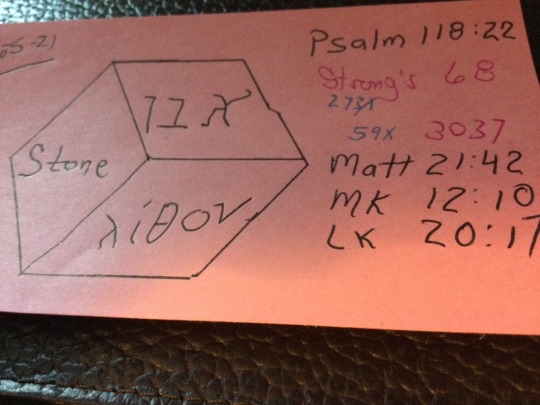
Theology Thursday 06/10/21 (paper excerpt) Jesus concludes the parable of the wicked vineyard tenants by quoting Psalm 118:22-23 (RSV), “The stone which the builders rejected has become the head of the corner. This is the Lord’s doing; it is marvelous in our eyes.” Both Matthew 21:42 and Mark 12:10-11 present this long quote word for word as it appears in the Septuagint (LXX 117:22-23). Luke 20:17 includes only verse 22, but also verbatim from the LXX. Nowhere else does Jesus “quote an OT passage to conclude a parable.”37 Therefore this quote becomes significant to anyone seeking to discern Jesus’ hermeneutic, especially timed as it is after the triumphal entry and the cleansing of the temple, giving it a distinctly Messianic flavor. The LXX Greek word used for “stone” is λίθος rather than the better known words in its semantic field such as πετρος or κηφᾶς (from Aramaic), possibly because it better reflects the building material flavor from the Hebrew ןבא. In Matthew and Luke Jesus explains the quote by implying that he himself is this stone which can be deadly to those who dash themselves against it or upon whom it falls. The stone metaphor would have been familiar to first-century Jews as “an open-ended challenge: it is the cornerstone for those who believe, but the stumbling stone for those who do not, whether Jew or Gentile.”38 In all three synoptic gospels, the chief priests, scribes and Pharisees correctly perceive that the parable with its concluding Psalm quote applies to them and they are infuriated.
0 notes
Text
Theology Thursday
‘Immediately’ in Mark Much theological discussion has taken place around the use of “immediately” in Mark’s gospel. It lends a sense of urgency that the other Gospels lack. The Greek word is εὐθύς (you thoos). I counted 17 appearances of the word in Mark (confirmed by Strong’s, which lists 55 total, none in the Old Testament) so it surprised me that another resource I use listed only 15 occurrences, not all in Mark. Even more surprising, three of those were quotes of Isaiah 40:3 in Matthew 3:3, Mark 1:3 and Luke 3:4, none of which are translated ‘immediately’ in English, but instead ‘straight’. Evidently this quote from Isaiah has less to do with geometry & geography than I thought! The definitions of the Greek include ‘directly’ and ‘straightaway’. Searching ‘straight’ in Strongs leads to 70 uses, including one in Psalm 5:8(9) which sounds similar to the Isaiah verse we all know: “Lead me O LORD in thy righteousness because of my enemies; make thy way straight before me.” (RSV) The Hebrew word is יָשַׁר (transliterated yawshar), which has a broad range of meanings including ‘right’ and ‘pleasant’, a far cry from ‘immediately’. This little word study led me in directions I did not expect. God’s ways are not my ways, but I always appreciate following them.
0 notes
Photo

Theology Thursday: Isaiah Isaiah has been a good Advent (and pre-Advent) study because it is full of Messianic imagery. As we await the celebration of our Savior’s birth, let us read again Isaiah 7:14, “Therefore the Lord himself will give you a sign. Look, the virgin shall be with child and bear a son, and you shall name him Emmanouel.” (NETS) Matthew 1:23 quotes this verse and applies it to the birth of Jesus; "Behold, the virgin shall be with child, and shall bring forth a son. They shall call his name Immanuel;" which is, being interpreted, "God with us." The original languages are clear about the word ‘virgin’. In Hebrew it is עַלְמָה a seldom used word, but clarified by usage in a few other verses, most notably Song of Solomon 1:3, where virgins are distinguished from non-virginal females. In Greek it is παρθένος {par-then'-os} also seldom used but clear to scholars and easy for readers to understand until our generation raised baseless quibbles with it. Let us get back to a child-like faith that basks in the miraculous sign. Thank you, God for the greatest gift, ‘God with us’, Jesus.
0 notes
Photo

Theology Thursday: Good News! As we observe the Festival of Lights (John 10:22) and anticipate celebrating the birth of our Savior, what better passage to think about than Luke 4:18-21, in which Jesus quotes Isaiah 61:1-2 and applies the words to Himself? “Luke 4:18 The Spirit of the Lord is upon me, because he hath anointed me to preach the gospel to the poor; he hath sent me to heal the brokenhearted, to preach deliverance to the captives, and recovering of sight to the blind, to set at liberty them that are bruised,” (KJV) The concise Hebrew verb בָּשַׂר is translated εὐαγγελίζω when Jesus quotes it (using the exact Greek verb form from the LXX). It translates more extensively into English phrases like ‘bring good news (NETS)’ , ‘preach the gospel’ or ‘evangelize’. The good news is deliverance (Psalm 40:9); more exactly, salvation (Psalm 96:2). The deliverance in the Hebrew Scriptures is often practical, even military, but the word contains layers of meaning. Hanukkah celebrates a military victory consecrated by miraculous provision of oil for light. The ultimate salvation is embodied in Messiah, Jesus. What could be better news than that?
0 notes
Photo

Thanksgiving Theology Among people who are so blessed with the basic necessities of life that we need to remind ourselves annually to give thanks, there is a surprising level of discontent and darkness. There is one thing that can dispel the darkness and enrich our lives daily - God’s word. Psalm 119:105; "Your word is a lamp to my feet and a light to my path." The Hebrew word for light, אוֹר also appears in Isaiah 9:2 (3a) “The people who walked in darkness have seen a great light. “ This prophetic verse is quoted in Matthew 4:16 to introduce Jesus’ formal ministry. The Greek word for light φως is the root of our word phosphorus. When darkness seems overwhelming I know where to turn for light. I am thankful for the opportunity to immerse myself in scripture to surround myself with light. May I find ways to share that light with others.
0 notes